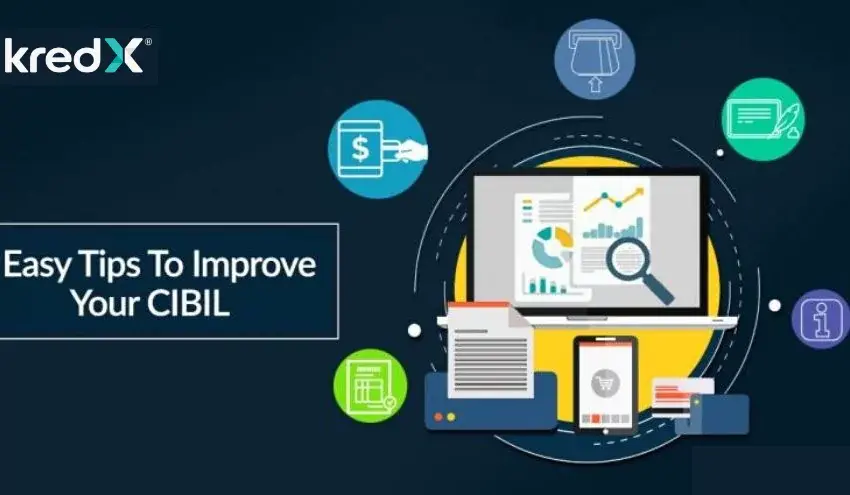
5 Easy Tips To Improve Your Credit Score
The term “Credit Score” often leads to uneasy feelings, even for those who consider themselves financially savvy. Managed by the first credit information company in India, the Credit Information Bureau (India) Limited (CIBIL), your credit score is a numerical representation of your creditworthiness. Established in 2000, CIBIL has been India’s most trusted credit reporting agency. Your CIBIL score ranges from 300 to 900, with anything above 750 considered healthy. If you find yourself on the lower end of the scale, there’s no need to panic. This article will equip you with strategies to improve your credit score, which will, in turn, enhance your financial stability.
Build A Credit History
Contrary to popular belief, avoiding credit doesn’t boost your CIBIL score. A well-managed credit history contributes to 30% of your score. This blog will explore how to establish and maintain a positive credit history.
Why Credit Score Matters
A widespread misconception is that having no credit guarantees a good score. In reality, 30% of your CIBIL score alone hinges on your credit history.
How to Improve Credit Score?
Making friends with credit and using it wisely is key. Establish a credit history by taking out a small loan or opening a credit card account. Make sure to handle these responsibly to kickstart your journey to a high CIBIL score.
Pay Your Dues On Time
Paying your bills and loans on time is critical to maintaining a healthy CIBIL score. This section will guide you on managing timely payments to impact your credit history positively.
Why It Matters
Timely repayment of bills and loans is a straightforward but crucial aspect of maintaining a healthy credit history.
How to Improve
Automated payments or calendar reminders can help you manage your dues effectively. Timely payments are not just an indication of your reliability; they’re also an investment in your future borrowing ability.
Keep Older Accounts Open
Contrary to common advice, closing older or unused credit accounts can hurt your CIBIL score. This section will explain why keeping these accounts open contributes to a healthier credit history and a better overall CIBIL score.
Why It Matters
Believe it or not, the length of your credit history contributes to 25% of your CIBIL score.
How to Improve
Avoid the mistake of closing your older or unused credit cards. Keeping these accounts open and active can add more positive data to your credit history as long as you manage them well and make any minimal payments required.
Pay Credit Card Bills in Full
Making minimum payments on your credit card might seem convenient, but can negatively impact your CIBIL score. This section delves into the importance of paying your credit card bills in full each month.
Why It Matters
When your credit card bill comes around, you’re given two payment options: pay in full or the minimum amount. Choosing the latter can adversely affect your CIBIL score, as the remaining amount is overdue.
How to Improve
Commit to paying your full credit card bill each month. This will keep your CIBIL score healthy and save you from accumulating debt and additional interest.
Be Cautious When Applying for New Loans
Applying for multiple loans in a short period can label you as credit-hungry, adversely affecting your CIBIL score. This section will discuss how to apply for loans to maintain a positive credit profile strategically.
Why It Matters
Taking on multiple loans won’t do your CIBIL score any favours. It portrays you as credit-hungry, which isn’t a good look in the eyes of future lenders.
How to Improve
Apply for new loans only when necessary. When you do, try to include a mix of secured and unsecured loans, like personal, auto, and home loans. This diversity contributes positively to your CIBIL score.
Additional Tips
Secured Credit Cards – Opting for a credit card against a fixed deposit can help improve your score effectively.
Avoid Overuse of Credit – Maxing out your credit limit regularly is a red flag, indicating potential financial instability.
Think Before You Spend – Impulse buying can harm your financial health. Always take time to consider significant purchases.
Conclusion
Improving your CIBIL score is a task that takes time to accomplish; it requires an informed, disciplined approach that takes time and consistent effort. It’s not just about addressing a low score but also about maintaining a good one, and both tasks are ongoing commitments. The tips outlined in this article—from establishing a credit history, paying your bills on time, keeping older accounts open to being cautious when applying for new loans—are more than just strategies. They represent a philosophy of responsible financial behaviour that will serve you well beyond merely boosting your CIBIL score.
In essence, they lay the foundation for long-term financial health and freedom. Remember, your credit score reflects your financial choices and habits, and a good score can open doors to opportunities like favourable loan terms, lower interest rates, and even better employment prospects. Start today, make consistent efforts, and watch your CIBIL score transform over time into a testament to your financial responsibility and integrity.
Disclaimer
The information contained in this article is for general guidance only. For personalized financial advice, consult a qualified financial advisor.



